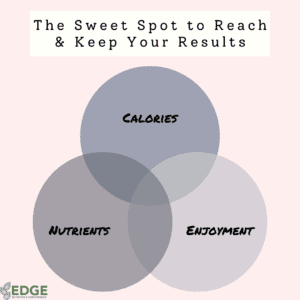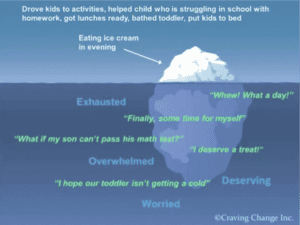When it comes to nutrition, myths spread faster than the truth. From social media to outdated health advice, misinformation is everywhere. As a registered dietitian, I often hear clients repeat the same myths that hold them back from feeling their best.
Let’s debunk 10 of the most common nutrition myths with evidence-based facts you can trust.

Chantelle Greentree, RD
1. Carbs Make You Gain Weight
Myth: All carbohydrates lead to weight gain.
Fact: Carbohydrates are not inherently fattening. Whole, unprocessed carbs—like oats, lentils, fruits, and sweet potatoes—are nutrient-dense and support a healthy metabolism. It’s refined carbs, like white bread and pastries, that are more strongly associated with weight gain and chronic disease (Hu et al., 2012; Reynolds et al., 2019).
2. Cutting Out Food Groups Is Healthier
Myth: Removing entire food groups makes your diet “cleaner.”
Fact: Eliminating whole food groups—like dairy, grains, or legumes—without medical necessity can lead to nutrient deficiencies and disordered eating. A diverse diet that includes all food groups supports optimal health (Melina et al., 2016; GBD 2017 Diet Collaborators, 2019).
3. Gluten-Free Is Always Healthier
Myth: Gluten-free foods are better for everyone.
Fact: Fact: Unless you have celiac disease or gluten sensitivity, there’s no benefit—and possibly some harm—in avoiding gluten. Many gluten-free products are lower in fibre and whole grains, which could increase your risk for heart disease (Gaesser & Angadi, 2012; Lebwohl et al., 2017).
4. Juice Cleanses Detox Your Body
Myth: You need juice cleanses to “detox.”
Fact: Your liver and kidneys already detox your body. Juice cleanses often lack protein and fibre and aren’t scientifically proven to remove toxins or aid long-term weight loss (Klein & Kiat, 2015).
5. Fruit Is Bad Because of Sugar
Myth: Fruit should be limited due to its sugar content.
Fact: Fruit contains natural sugars, but also fibre, water, vitamins, and antioxidants. These factors slow sugar absorption and provide protective health effects. Higher fruit intake is associated with reduced risk of heart disease, stroke, and certain cancers (Aune et al., 2017; Wang et al., 2014).
6. Fat Makes You Fat
Myth: Eating fat leads to weight gain.
Fact: Your body needs fat for hormone production, brain health, satiety, and nutrient absorption. Replacing saturated fats with unsaturated fats improves cardiovascular health. Dietary fat, especially from nuts, seeds, and olive oil, is associated with weight maintenance and improved metabolic markers (Mozaffarian et al., 2011; Schwingshackl et al., 2018).
7. Snacking Is Always Bad
Myth: Eating between meals leads to weight gain.
Fact: Nutritious snacks can stabilize blood sugar and prevent overeating. The key is choosing snacks that combine protein, healthy fats, and fibre, such as Greek yogurt with berries or hummus with vegetables. Research supports snacking quality over frequency (Chapelot, 2011).
8. You Need Protein Powders to Build Muscle
Myth: You can’t build muscle without supplements.
Fact: Protein powders are convenient, but most people can meet their protein needs through real food. Eggs, tofu, lentils, dairy, and fish are excellent whole-food sources that also offer fibre, vitamins, and minerals. Unless you’re an athlete with high demands or have limited access to protein-rich foods, supplements aren’t necessary. Whole foods also provide additional health benefits that protein powders can’t match (Phillips & van Loon, 2011).
9. You Must Drink 8 Glasses of Water a Day
Myth: Everyone needs exactly 8 cups of water daily.
Fact: Hydration needs vary by individual based on activity level, climate, and body size. The “8 glasses” rule is a simplification. Fluid from food and beverages—including tea, coffee, fruits, and soups—count toward daily hydration. Pale yellow urine is a practical way your body tells you it’s well hydrated (National Academies, 2005).
10. Supplements Can Replace a Healthy Diet
Myth: Taking a multivitamin is just as good as eating well.
Fact: Supplements may fill specific nutrient gaps but cannot replicate the complexity of whole foods. Whole foods contain synergistic compounds—such as antioxidants, fibre, and phytonutrients—that supplements alone can’t provide. A balanced diet remains the gold standard for disease prevention and vitality. (Manson & Bassuk, 2018).
Final Thoughts
Nutrition doesn’t have to be complicated. By focusing on evidence-based guidance instead of fear-based fads, you can build a sustainable, nourishing way of eating that works for you. If conflicting nutrition advice feels overwhelming, a registered dietitian can help bring clarity and personalized support.
Ready to take control of your health? Book a FREE 15-minute discovery call with a dietitian to create a customized nutrition plan tailored to your lifestyle and goals. Click here to schedule your call – I’d love to help you start your journey to better health.
References
Manson, J. E., & Bassuk, S. S. (2018). Vitamin and Mineral Supplements: What Clinicians Need to Know. JAMA, 319(9), 859–860.
Hu, F. B., et al. (2012). Changes in diet and lifestyle and long-term weight gain in women and men. N Engl J Med, 364(25), 2392–2404.
Reynolds, A., et al. (2019). Carbohydrate quality and human health: a series of systematic reviews and meta-analyses. Lancet, 393(10170), 434–445.
Melina, V., et al. (2016). Position of the Academy of Nutrition and Dietetics: Vegetarian Diets. J Acad Nutr Diet, 116(12), 1970–1980.
GBD 2017 Diet Collaborators. (2019). Health effects of dietary risks in 195 countries, 1990–2017. Lancet, 393(10184), 1958–1972.
Gaesser, G. A., & Angadi, S. S. (2012). Gluten-free diet: imprudent dietary advice for the general population? J Acad Nutr Diet, 112(9), 1330–1333.
Lebwohl, B., et al. (2017). Long term gluten consumption in adults without celiac disease and risk of coronary heart disease. BMJ, 357, j1892.
Klein, A. V., & Kiat, H. (2015). Detox diets for toxin elimination and weight management: a critical review. J Hum Nutr Diet, 28(6), 675–686.
Aune, D., et al. (2017). Fruit and vegetable intake and the risk of cardiovascular disease, total cancer and all-cause mortality. Int J Epidemiol, 46(3), 1029–1056.
Wang, X., et al. (2014). Fruit and vegetable consumption and mortality. BMJ, 349, g4490.
Mozaffarian, D., et al. (2011). Changes in diet and lifestyle and long-term weight gain. N Engl J Med, 364(25), 2392–2404.
Schwingshackl, L., et al. (2018). Food groups and risk of all-cause mortality. Am J Clin Nutr, 107(3), 505–517.
Chapelot, D. (2011). The role of snacking in energy balance. Physiol Behav, 104(4), 535–543.
Phillips, S. M., & van Loon, L. J. (2011). Dietary protein for athletes. J Sports Sci, 29(S1), S29–S38.
National Academies of Sciences, Engineering, and Medicine. (2005). Dietary Reference Intakes for Water, Potassium, Sodium, Chloride, and Sulfate.







Add a comment